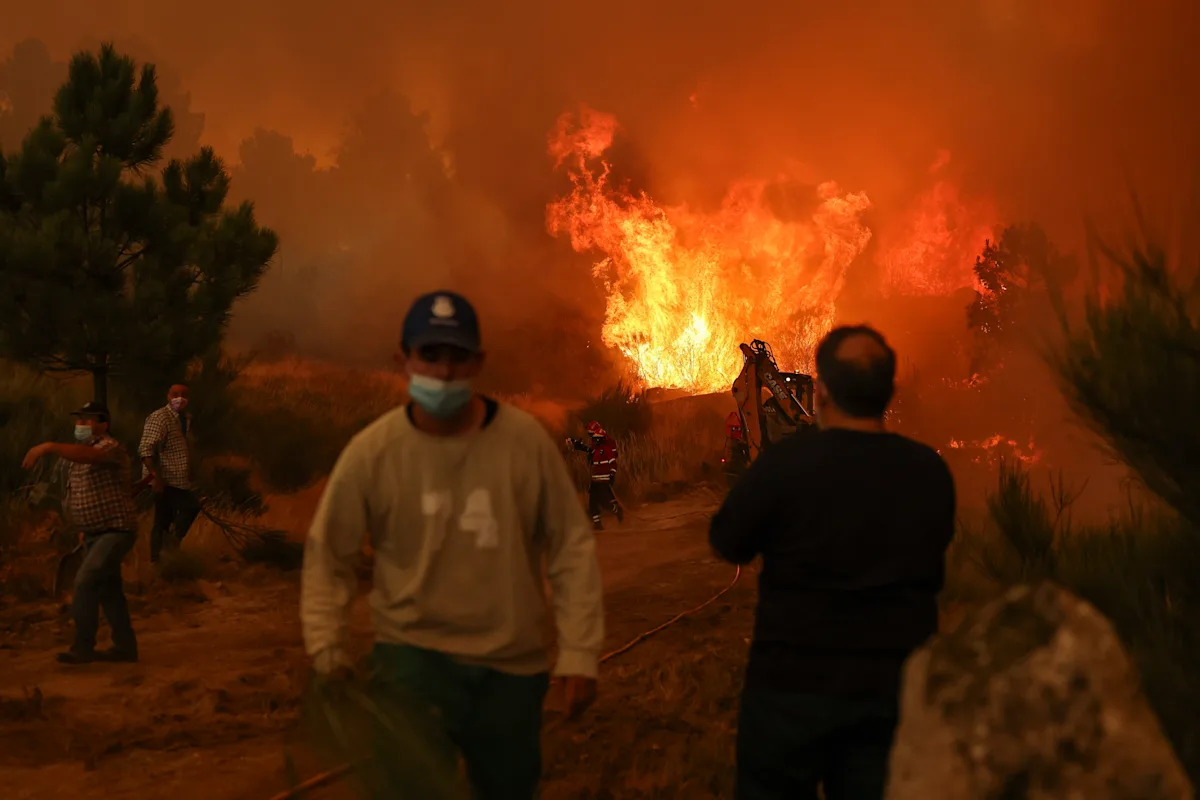An intense heatwave continues to grip parts of southern Europe, fuelling dozens of wildfires and forcing thousands to evacuate their homes.
Across Europe, at least three people have died and red alerts have so far been issued for parts of Spain, Portugal, Italy, France and the Balkans.
In Spain, forecasters say temperatures may reach 44C in popular tourist cities such as Seville and Cordoba, with similar highs expected in southern Portugal.
The extreme heat has triggered top-level weather alerts in parts of southern France and the western Balkans, which saw temperatures exceed 40C on Monday.
Where are the wildfires?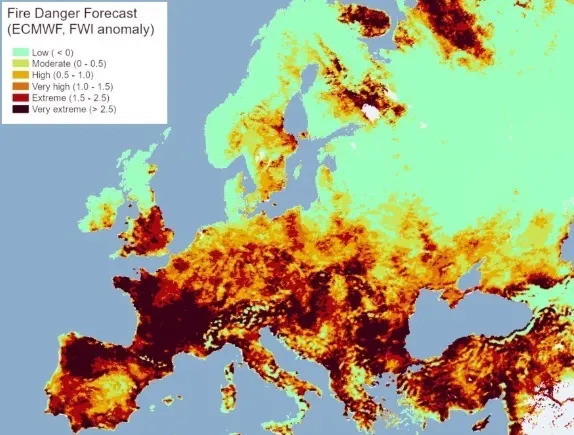
The fire danger threat for the next seven days, from the European Union’s Copernicus Earth observation programme. (EU)
In Spain, flames engulfed more than 1,000 hectares in the Tres Cantos region near Madrid after a fire broke out on Monday evening.
Winds of over 70km/h pushed the fire close to homes and forced hundreds to flee before authorities brought the fire under control, but with more hot weather due this week emergency services are on red alert.
Elsewhere in Spain, fires raged across Castile and Leon, Castile-La Mancha, Andalusia and Galicia, with around 1,000 soldiers deployed nationwide to support firefighting efforts.
Nearly 4,000 people were evacuated in Castile and Leon alone, where more than 30 blazes were reported, and a fire threatened Las Medulas, a UNESCO World Heritage Site.
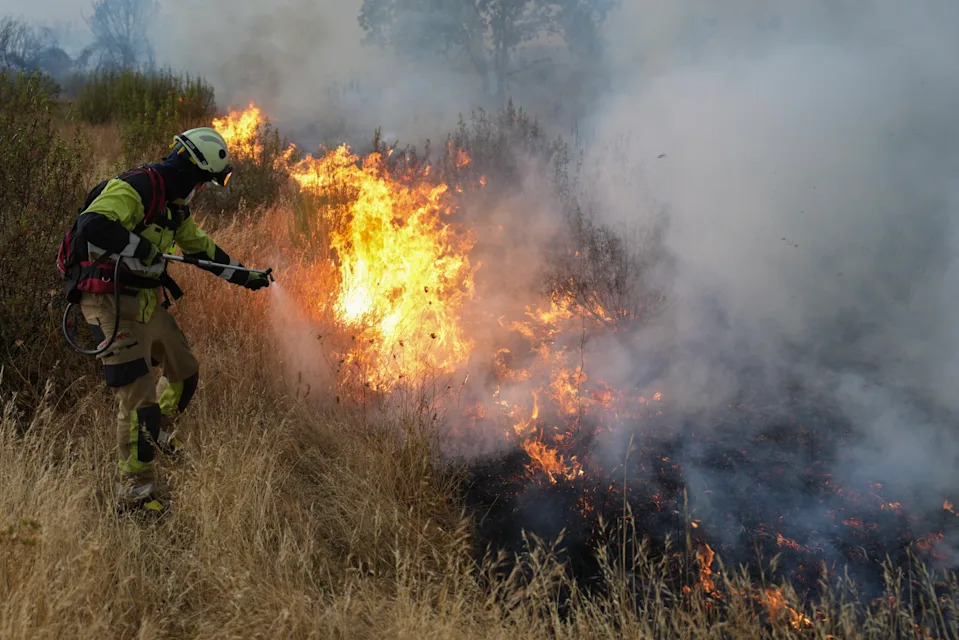
A firefighter works to extinguish a wildfire near Losacio, north of Zamora. (AFP via Getty Images)
In Andalusia, around 2,000 people were moved from homes and hotels near the coastal town of Tarifa, on the Mediterranean coast.
In neighbouring Portugal, over 700 firefighters continued battling a major blaze in Trancoso, north-east of Lisbon.
Portuguese authorities have been provided additional support from Morocco after Portuguese water bombers malfunctioned.
Across the country, more than 1,300 firefighters and 14 aircraft were deployed with temperatures in some southern regions expected to reach 44C, in the coming days.
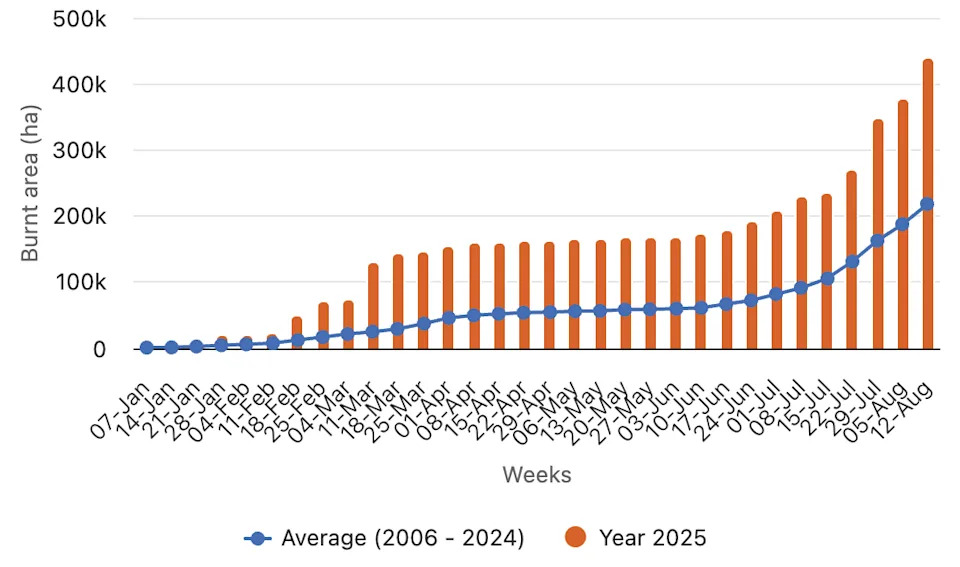
The area affected by fires has reached 439,568 hectares, higher than the average of 218,416.7 hectares recorded for this time of year over the past 19 years. (Copernicus)
Greece is facing one of its most severe wildfire outbreaks in years, with more than 150 fires burning across the country and nearly 5,000 firefighters and dozens of aircraft deployed.
Mass evacuations have been underway on the popular holiday island of Zakynthos and on Chios, beachgoers were rescued by boat as flames approached the shoreline.
On the Greek mainland, dozens of people were rushed to hospital after suffering from smoke inhalation near the western city of Patras.
In the Balkans, a soldier died when a water tanker overturned near the Montenegrin capital of Podgorica and a large blaze in Split, Croatia, was brought under control on Tuesday.
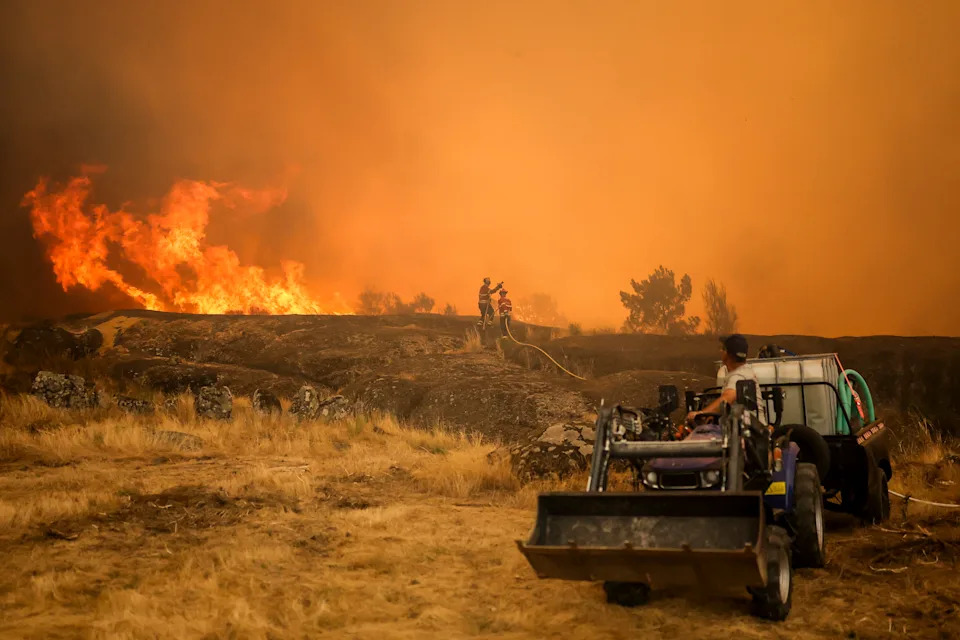
Firefighters and residents work to extinguish a wildfire at Casal do Monte village in Trancoso, on 13 August. (PATRICIA DE MELO MOREIRA/AFP via Getty Images)
Albania saw evacuations as fires spread through residential areas and an 80-year-old man died in a fire south of the capital, Tirana, officials said on Wednesday.
In Turkey, major fires in Canakkale and Izmir have been contained, but not before forcing hundreds to evacuate and causing the temporary closure of the Dardanelles Strait and Canakkale Airport.
Is it safe to travel?
It is always recommended that you check UK Foreign Office (FCDO) before you travel anywhere, and as of 13 August they have not issued any specific travel advice for the wildfires in Spain or Portugal.
The FCDO warns that wildfires happen often in Spain and Portugal during the summer months saying “wildfires are highly dangerous and unpredictable” and reminds travellers to be “aware of your environment when visiting or driving through woodland areas.”
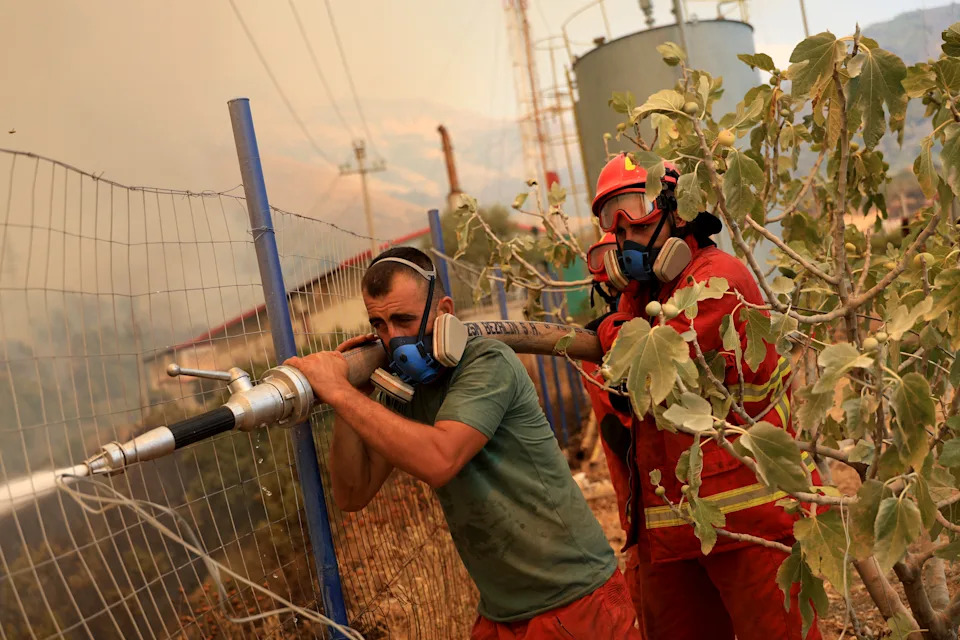
Firefighters spray water on a wildfire near the town of Delvine, south-east Albania, on 13 August. (ADNAN BECI/AFP via Getty Images)
Spain’s meteorological service Aemet, provides information on their website as to the risk of wildfires and temperatures.
The Foreign, Commonwealth and Development Office (FCDO) remind holidaymakers travelling to Greece and Turkey that there is a “high risk” of wildfires during the summer season.
They also encourages travellers to Greece to register for alerts from the Greek government’s Emergency Communication Service.
Sean Tipton, Association of British Travel Agents (ABTA) spokesman, told Yahoo News: “Wildfires are a fact of life in the Mediterranean, but it is pretty rare for wildfires to affect tourist areas.
“When they do happen they can be dangerous so its important to always follow the advice of local authorities to the letter. If they say you should evacuate, then you should do so.”
Will my insurance pay out if I have to cancel my travel plans?
If your holiday destination is in a region affected by wildfires, it’s important to assess whether it’s a good idea to go ahead with the trip or stay at home – and where you stand from an insurance perspective.
The ABTA advises against uninsured travel, and purchasing travel insurance that is applicable to your trip is essential before you leave.
If the FCDO has deemed your destination safe to travel and your flights, accommodation and transfers are all going ahead as scheduled, then you may be unlikely to get compensation if you decide to stay at home.
Rhys Jones, Go.Compare travel insurance spokesperson, told Yahoo News that travellers should “check the cover limits on their policy” and consider whether you want to add extra protections.
“If the Foreign Office is advising against travel to your holiday destination, then going ahead anyway could cause you problems – as travel insurers may refuse your claim if you’ve travelled against their recommendations,” said Mr Jones.
“If wildfires or extreme weather do cause disruption to your trip, such as cancelled flights and delays, you’ll usually be covered for this under a standard travel insurance policy – and the unpredictability of events like these is one reason it’s so important to have travel insurance in place.”
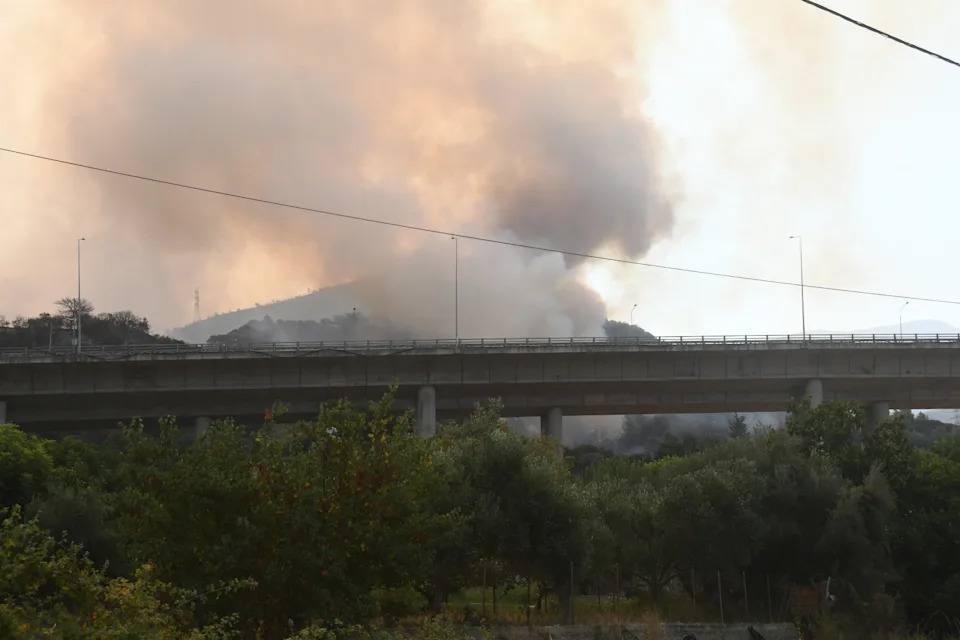
Firefighting efforts continue from both air and ground as flames spread rapidly across a large area due to strong winds after a wildfire broke out in the Fotia region of Patra, Greece. (Anadolu via Getty Images)
If you have booked a package holiday, and the travel agent cancels your trip, the company should give you one of three options.
Either an option to defer your date of travel, go to an alternative destination, or to have your money back.
If you have booked your trip independently, and your flight is cancelled you are protected under UK law, according to the Civil Aviation Authority (CAA).
This means airlines are required to offer care and assistance if your flight is delayed by two or more hours, depending on the length of your journey.
This can include food and drink vouchers, refunds for phone calls or essential communication.
And if your flight is cancelled and rebooked for a later date, your airline must also provide hotel accommodation, if needed, and transport to and from that accommodation.
However, compensation for cancellations or delays caused by wildfires or extreme heat is unlikely as these are likely to be classed as “extraordinary circumstances”, meaning the disruption is not considered the airline’s fault.
The CAA states that while cancellations may lead to delays in rebooking, the airline is still responsible for getting you to your final destination.
If a hotel cancels your stay then you would need to read their cancellation policy, and you are likely to receive your money back as they are not providing a service, whether you have insurance or not.
Jo Rhodes, Which? Travel Expert, said it’s important that travellers don’t cancel their trips in the coming days.
She said: “Travellers who cancel now will likely forfeit their right to a refund or rebooking, and as the FCDO has not warned against travel to the affected regions, are unlikely to be able to claim on their travel insurance.
“As a rule, insurance firms won’t make allowances for ‘disinclination to travel’.
“Instead, holidaymakers should wait until closer to the departure date to see if the holiday can go ahead or what flexible booking options are offered from the tour operator or airline. Travel companies will be prioritising anyone due to depart in the next couple of days.”
